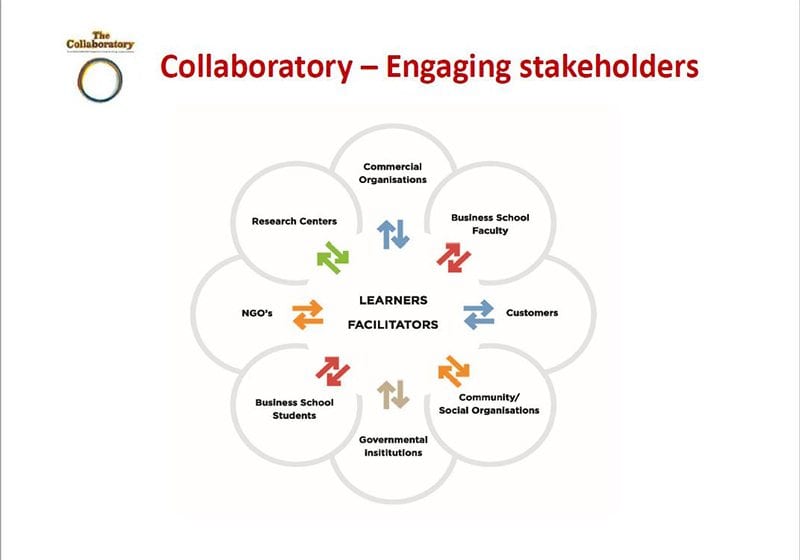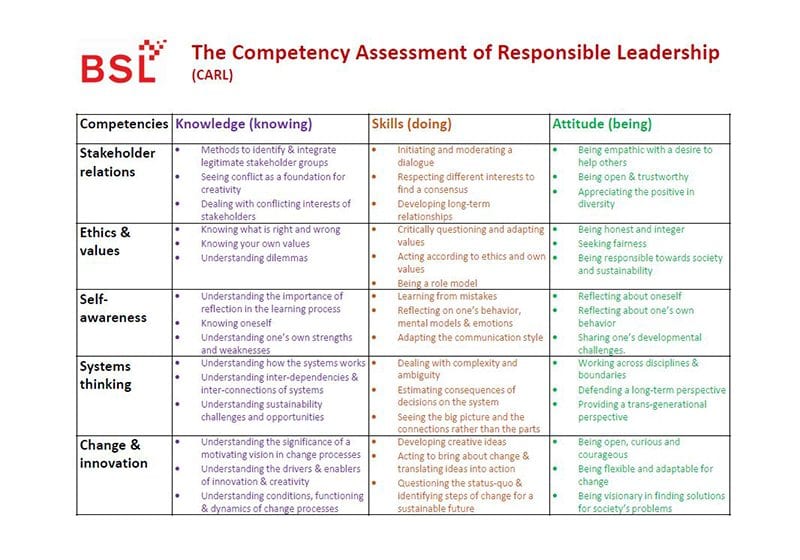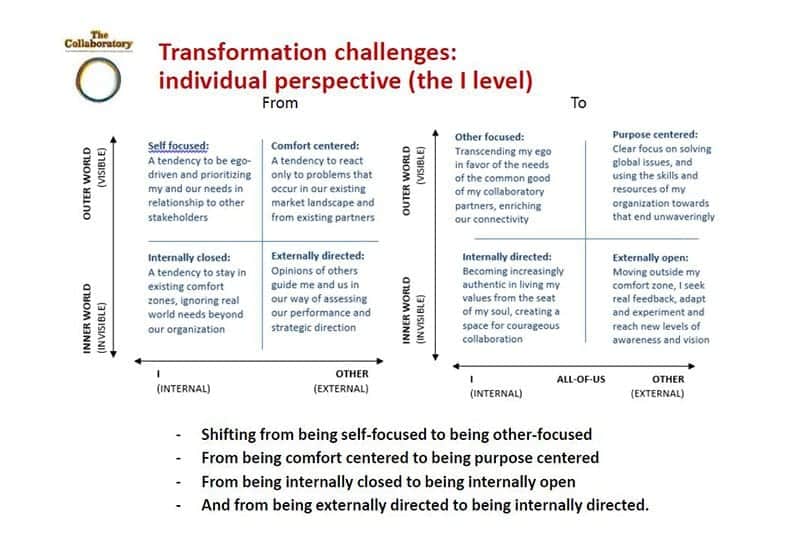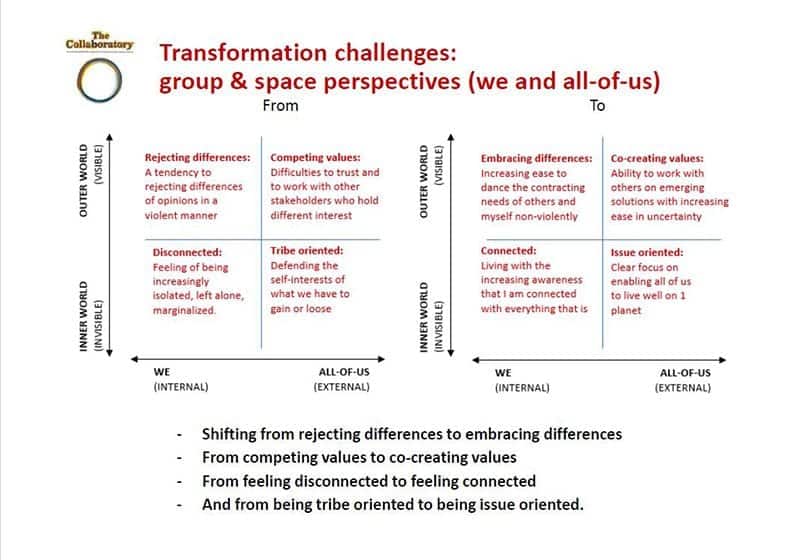
The Collaboratory Practice
The Collaboratory Practice
The “collaboratory” is an open-space, creative method for hosting meaningful conversations where various stakeholders tap into the collective intelligence to generate solutions to complex problems.
Business School Lausanne, has enthusiastically embraced the “collaboratory” method in running community events since early 2013.
The idea originates from the visioning work of a large group of people – including scholars, artists, consultant, students, activists, and other professionals – who worked together on the 50+20 initiative aiming at radically transforming management education.
By fusing two elements, “collaboration” and “laboratory”, the word “collaboratory” suggests the construction of a space where people explore collaborative innovations. “The laboratory also nicely implies a notion of exploration and experimentation, thus staying clear of the notion of perfection or standardization,” explains BSL’s Dean, Dr. Katrin Muff. Dr. Muff edited and co-authored “The Collaboratory” book (Greenleaf Publishing, July 2014) which introduces the “collaboratory” concept and offers practical recommendations on adopting this engagement process to harness collective intelligence.
“The philosophy of the collaboratory involves a facilitated circular space that is open to stakeholders to meet and discuss burning societal issues. It is an open space for all stakeholders where action learning and action research join forces, and students, educators, and researchers work with members of all facets of society to address current dilemmas.” – suggests Dr. Muff in defining what “collaboratory” really means. “It is a place where people can think, work, and learn together to invent their common future,” she continues to explore the concept.
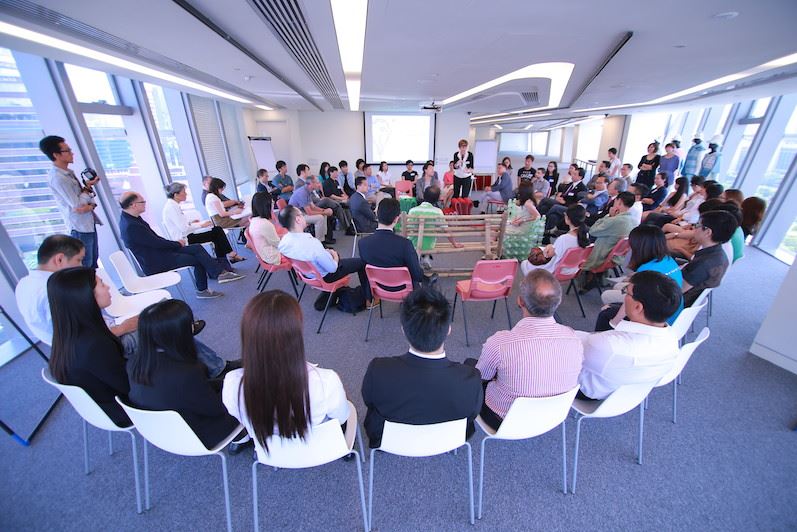
Facilitators of thus collective process are highly experienced coaches who act as lead learners and guardians of the collaboratory space. They see themselves as transient gatekeepers of a world in need of new solutions. Subject experts are responsible for providing relevant knowledge and contributing it to the discussion in a relevant and pertinent matter.
The collaboratory idea has been picked up by various individuals and organizations that represent the education, business, NGO, and social enterprise communities and advocate the benefits of collective thinking in making the world a better place.
Book Reviews
More and more people today recognize that the problems we face will require an order-of-magnitude increase in our capacity to collaborate across all manner of institutional, national, sectoral, and cultural borders. But I fear the gap between rhetoric and reality will sink this ship before if ever gets out of port – unless the emerging insights from master practitioners like those in The Collaboratory spread quickly.- Peter Senge, MIT and the Society for Organizational Learning
Every few years a new technology energizes the field of planned change. The Collaboratory is the latest example. Every change agent needs to read this book. – Robert E. Quinn, Margaret Elliott Tracy Collegiate Professor in Business Administration & Professor of Management and Organizations, University of Michigan
Collaboration and Co-creation are needed NOW; this book provides the practical tools for making change happen – Jean-Paul Jeanrenaud, Director, One Planet Leaders, WWF International
About “The Collaboratory” book
“The Collaboratory: A co-creative stakeholder engagement process for solving complex problems” (Greenleaf Publishing, July 2014) explores the transformation that emerges when groups spread around the world working on similar issues discover synchronicities, often cross-pollenating, and collaborate rather than compete.
Offering practical recommendations and benefits, and bringing together insights from a range of experienced academics, practitioners and facilitators, The Collaboratory is a handbook for experienced or aspiring practitioners in all fields of change: in society, in organizations of all kind and in the field of education.
The book is co-written by twenty-four contributing authors. Contributors include Thomas Dyllick, Mark Drewell, John North, Paul Shrivastava, Ronald Fry, Caroline Rennie, Claire Maxwell and Jonas Haertle.
It was also recommended by Peter Senge, MIT and the Society for Organizational Learning: “More and more people today recognize that the problems we face will require an order-of-magnitude increase in our capacity to collaborate across all manner of institutional, national, sectoral, and cultural borders. But I fear the gap between rhetoric and reality will sink this ship before if ever gets out of port – unless the emerging insights from master practitioners like those in The Collaboratory spread quickly.”
Leadership in Transition
The Leadership in Transition (LiFT) projects is working on further advancing the Collaboratory methodology and practice in four European partner institutions (Norway, Germany, Sweden, Austria).
Collaboratory Training
Business School Lausanne runs Collaboratory trainings for future change agents. Today the world needs leaders that are capable to engage beyond the borders of their organizations. Knowing how to deal with internal strategies and tactics is not sufficient to tackle the global wicked problems that are forcefully changing the world in directions not desirable for any stakeholder. The Collaboratory is an incredibly powerful tool that enable change agents to facilitate solutions that have a much higher impact as they emerge from the future rather than the past. The participation to this training will equip future Change Agents with the competencies and learning dimensions to be mindful callers and participants of transformative Collaboratories.
Business School Lausanne can recognize 2 ECTS credits for the complete training that include the participation to a Collaboratory event.
Click on images below for more information.
